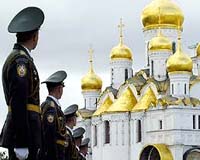 |
Washington (AFP) Sept 25, 2010 For years, US policymakers have watched uneasily as China grew more assertive, fearing that the emerging power would cut into Washington's clout in one of the world's most dynamic regions. But in recent weeks, China's rise has instead offered a golden opportunity for the United States, which has swiftly rallied behind the growing number of Asian nations that have butted heads with Beijing. After China piled pressure on Japan to free a captain captured near disputed islands, the United States said it considered the chain -- known as the Senkaku in Japanese and Diaoyu in Chinese -- to be under Tokyo's administration, meaning that US forces would be obliged by treaty to defend Japan in an attack. With Southeast Asian nations voicing alarm over Chinese attempts to exert sovereignty in disputed waters, President Barack Obama and regional leaders in a summit Friday called for freedom of navigation in the South China Sea. The United States also defied Chinese warnings and carried out joint war games with South Korea after accusing Beijing's ally North Korea of sinking a South Korean vessel. "It's always bad when an American lectures someone on arrogance, but the Chinese should beware of premature arrogance," said Ralph Cossa, president of the Center for Strategic and International Studies' Pacific Forum. "The more they flex their muscle in the South China Sea, the more people dial 911 and hope the (US Navy's) Seventh Fleet will answer. And the same thing with the Japanese," Cossa said. In Japan, where a left-leaning government swept to power last year pledging to be more "independent" from the United States, Prime Minister Naoto Kan has thrown his support behind a US base plan and appointed one of his party's most hawkish figures, Seiji Maehara, as foreign minister in a recent reshuffle. The United States has also built growing partnerships with Southeast Asia, particularly Indonesia and former war foe Vietnam, two countries with historically tense relations with China. The Obama administration insists it has no grand designs to encircle China. Since taking office, Obama has sought broader relations with China, including cooperation on reviving the global economy and fighting climate change. But Kurt Campbell, the assistant secretary of state for East Asia, said he has recently seen a shift in views in the region among those convinced of US decline. "I see more and more in Asia a recognition that the United States is going to be a dominant, key player in Asia for at least the better part of the next 40 or 50 years," Campbell said. Asia has a growing recognition that "yes, China's role on the global stage has grown much larger in recent years, but the truth is the United States has never left the stage and we're going to be a main actor on that stage for decades to come," Campbell said. The United States stations some 100,000 troops in Asia excluding Afghanistan, the vast majority in Japan and South Korea. The US defense budget for the fiscal year beginning in October is 700 billion dollars, far above China's 150 billion dollar budget last year as estimated by the Pentagon. Deputy Secretary of State James Steinberg said the United States accepted that China would expand its military but hoped it would use its forces in a positive way -- praising as an example Beijing's naval deployment to fight piracy off Somalia. "There are ways in which China's military modernization can contribute to and enhance regional and global security, and there are ways that could pose some risks to that," Steinberg said. However, a Pentagon study in August found that China's military had already secured a strong edge over Taiwan, which Beijing claims, and that it was increasingly looking to exert its influence throughout Asia. Walter Lohman, director of the Asian Studies Center at the conservative Heritage Foundation, said the changing dynamic in Asia has been China's growing assertiveness, not any shift in US policy. "The Chinese really believe that we are rallying against them," Lohman said. "They're missing a very important point -- the Vietnamese are coming to us and the Japanese are coming to us, not the other way around."
Share This Article With Planet Earth
Related Links Learn about the Superpowers of the 21st Century at SpaceWar.com Learn about nuclear weapons doctrine and defense at SpaceWar.com
 Power struggle pits mayor against Kremlin
Power struggle pits mayor against KremlinMoscow (UPI) Sep 24, 2010 The mayor of Moscow might have to leave his post next week after having been caught in a dangerous power struggle between Russian President Dmitry Medvedev and Prime Minister Vladimir Putin. Yuri Luzhkov, a barrel-chested man who has ruled Moscow for nearly two decades, this week fled to Austria. The official version is that he and his wife, Russia's richest woman, are celebrating Luzhk ... read more |
|
| The content herein, unless otherwise known to be public domain, are Copyright 1995-2010 - SpaceDaily. AFP and UPI Wire Stories are copyright Agence France-Presse and United Press International. ESA Portal Reports are copyright European Space Agency. All NASA sourced material is public domain. Additional copyrights may apply in whole or part to other bona fide parties. Advertising does not imply endorsement,agreement or approval of any opinions, statements or information provided by SpaceDaily on any Web page published or hosted by SpaceDaily. Privacy Statement |